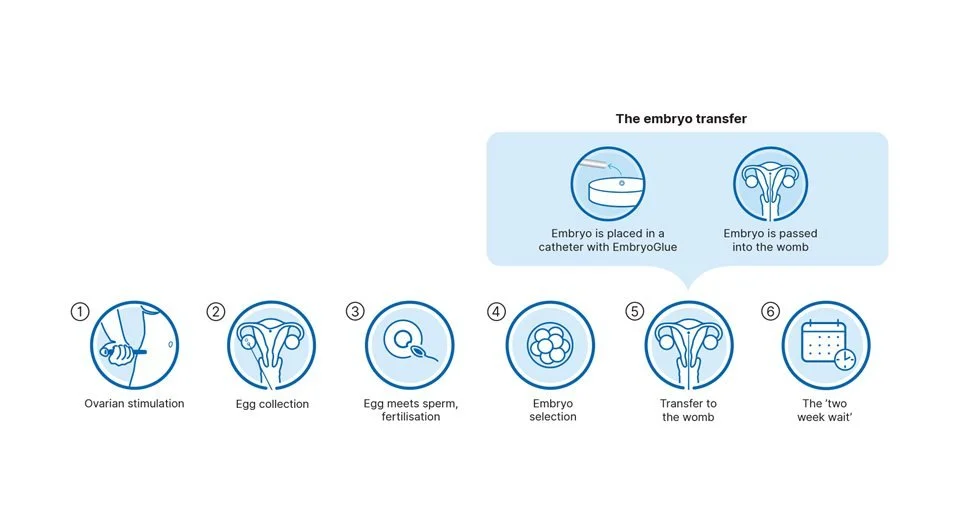Does Embryo Glue Work? Is It Safe and Does It Really Improve IVF Success Rates?
What Exactly is EmbryoGlue?
EmbryoGlue is an embryo transfer medium from Vitrolife. It is enriched with hyaluronan (also known as hyaluronic acid) and recombinant human albumin. Its composition is designed to mimic the natural environment of the uterus, aiming to enhance embryo implantation during in vitro fertilization (IVF) procedures.
EmbryoGlue medium contains a high concentration of hyaluronan (HA) - typically 0.5 mg/ml compared to the 0.125 mg/ml found in standard transfer media (Vitrolife AB, 2023). Its unique composition includes:
Key Components:
High molecular weight hyaluronan (500μg/ml): Mimics natural uterine fluid and is a naturally occurring glycosaminoglycan found in the female reproductive tract
Recombinant human albumin: Provides protein support and is an essential nutrient for embryo development
Energy substrates: Pyruvate, lactate, glucose
Buffering system: Maintains optimal pH during transfer
The Science Behind How It May Improve Implantation
Biological Mechanisms:
The elevated levels of hyaluronan in EmbryoGlue are thought to enhance the embryo's ability to adhere to the endometrial lining by creating a more viscous environment that promotes close contact between the embryo and the uterus. This adhesion is crucial for successful implantation.
Enhanced Embryo-Endometrium Interaction:
HA binds to CD44 receptors on both embryos and endometrium (Gardner et al., 2021)
Creates a "sticky" interface that may prolong embryo-uterine contact
Physical Protection:
High viscosity forms a protective matrix around the embryo
Reduces uterine contractions post-transfer (Lan et al., 2022)
Biochemical Signaling:
HA stimulates integrin expression (αvβ3) in the endometrium
Promotes inflammatory pathways needed for implantation (Bonavina et al., 2020)
Subgroups That May Benefit Most:
Frozen embryo transfers (7.1% higher LBR)
Patients with previous implantation failure
Cases with poor-quality embryos
Women >38 years old
Safety Profile: What the Research Shows
Embryo Safety Studies:
No differences in birth defects vs standard media (Bonavina 2020)
Equivalent neonatal outcomes (weight, gestational age)
No increased risk of ectopic pregnancy
Even if EmbryoGlue was not specifically used, check this study by Sungwook Chun that used hyaluronan-rich transfer media and found increased implantation and pregnancy rates!
Reported Adverse Effects:
Mild cramping post-transfer (3.2% of cases)
Slightly more viscous transfer (may require adjusted catheter)
Current evidence suggests that EmbryoGlue does not increase the risk of adverse events for patients undergoing fertility treatment or for the resulting offspring. However, as with any medical intervention, it is essential to consult with a fertility specialist to determine if EmbryoGlue is appropriate for your specific situation.
Cost-Effectiveness Considerations
Average cost: $200−$500 per cycle
NNT (Number Needed to Treat): ~20 transfers for one additional pregnancy
ASRM position: "May be considered for selected patients after counseling about modest benefits"
The Bottom Line
✔ Safe - No evidence of harm to embryos or pregnancies
✔ Modestly effective - Particularly in frozen cycles and RIF patients
✔ Mechanistically plausible - Strong scientific rationale for HA effects
✔ Not magic - Shouldn't replace proven strategies like PGT-A when indicated
EmbryoGlue is generally considered safe and may offer benefits in enhancing embryo implantation for some patients. Don’t take our word for it, see what patients are saying on Reddit! Nonetheless, its effectiveness can vary, and further high-quality research is needed to establish definitive conclusions.
The IVF Kitchen has been doing these blogs for a while now and if you’ve been reading then you know that our stance is every patient is different and has their individual needs. Some may react well to EmbryoGlue and some might not see any difference. If the case of EmbryoGlue, it is 100% safe to you and the embryo so it may be worth a shot if you are struggling with recurrent implantation failure!
“Sounds like a sticky situation.”


